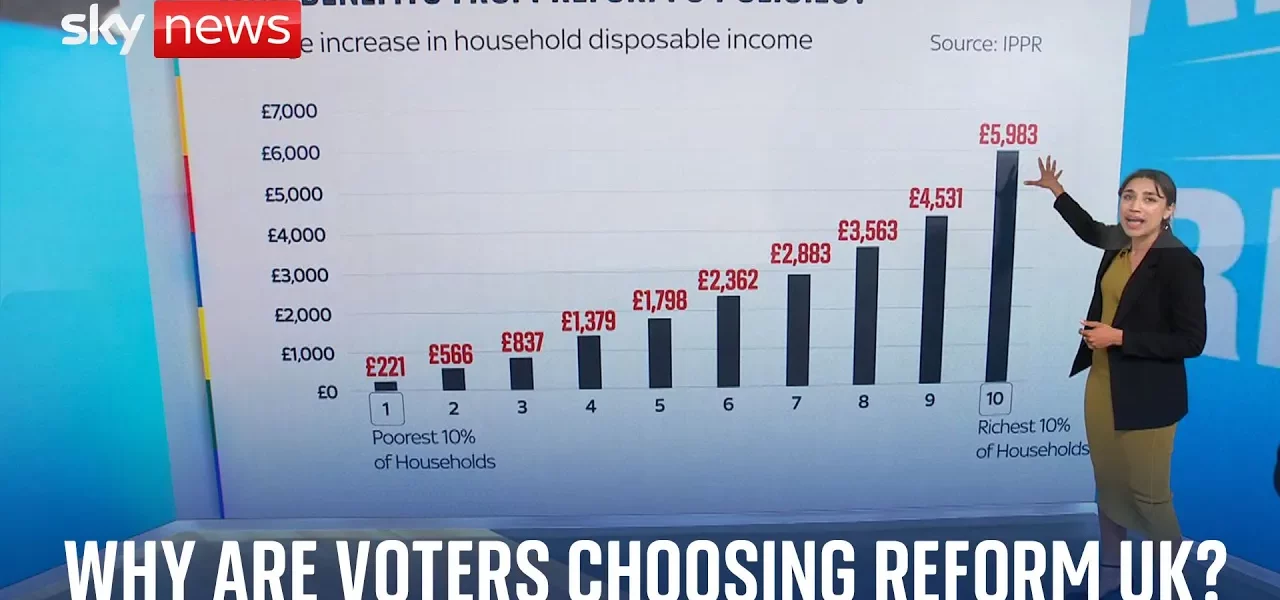Reform UK: The Rise of Nigel Farage and Its Impact on Left Behind Communities

In recent weeks, Reform UK has experienced a significant surge in support, particularly following Nigel Farage’s announcement of his leadership. This article delves into the party’s new polling data, its implications for various constituencies, and the controversial tax policies aimed at revitalizing ‘Left Behind’ communities.
Introduction to Reform UK’s Recent Surge
Reform UK has emerged as a noteworthy player in the UK political landscape, especially since Nigel Farage took the helm. The party’s recent polling indicates a potential to secure five parliamentary seats, a considerable leap from initial predictions. Constituencies such as Clacton in Essex and Boston and Skegness are now highlighted as key areas of interest. This article seeks to explore the factors contributing to this surge, the socio-economic conditions of the communities involved, and the implications of Reform UK’s policies on these regions.
The Polling Landscape
The latest polls suggest a newfound optimism for Reform UK, with projections indicating they could capture five seats in the upcoming elections. This marks a significant turnaround for the party. Here are some key insights:
- Polling Data: Recent surveys have shown a pivotal shift in voter sentiment, particularly in areas previously deemed ‘Left Behind’.
- Identified Constituencies: Clacton, Boston, Skegness, Ashfield, and others are now on the radar for potential wins.
- Voter Demographics: The party aims to engage voters in communities experiencing higher levels of deprivation.
Understanding ‘Left Behind’ Communities
Reform UK’s strategy centers on addressing the needs of what they refer to as ‘Left Behind’ communities. These areas are characterized by significant socio-economic challenges. Let’s explore the factors at play:
Socio-Economic Indicators
The ‘Left Behind’ communities often struggle with various issues, including:
- High levels of deprivation
- Low income and education levels
- Poor health outcomes
- Substandard housing conditions
Case Study: Clacton
Clacton exemplifies many of these challenges, ranking as the 45th most deprived constituency in the UK. The socio-economic struggles faced by residents underscore the urgency for effective policy interventions.
Reform UK’s Tax Policy: An Overview
One of the primary points of contention regarding Reform UK’s platform is their proposed tax policy, which aims to adjust the income tax thresholds significantly. Here are the details:
Key Components of the Tax Proposal
- Raise the income tax threshold to £20,000 per year.
- Increase the high-rate tax threshold to £70,000 per year.
- Reverse the current government’s freeze on tax thresholds, which they argue constitutes a stealth tax.
Impact on Different Income Groups
While the policy is marketed as beneficial for low-income earners, the actual impacts reveal a stark contrast:
- Top 10% of Households: Stand to gain approximately £5,983 annually.
- Bottom 10% of Households: Only benefit by £221 per year.
This disparity raises questions about the fairness and effectiveness of the proposed reforms.
Critique of the Tax Policy
Despite claims of benefiting the poorest, empirical data suggests otherwise. The policy appears to favor higher earners significantly more:
Disproportionate Gains for Higher Earners
Analysis shows that middle to high-income earners will see their disposable income increase at a much higher percentage rate compared to lower-income households. This leads to a fundamental critique of the party’s assertions:
- The middle to high earners stand to gain three times as much as the poorest 10%.
- The narrative of supporting low-income individuals is undermined by the data.
Conclusion
Reform UK’s rise in the political arena under Nigel Farage’s leadership reflects a complex interplay of socio-economic factors and voter sentiment. While their focus on ‘Left Behind’ communities is commendable, the implications of their tax policy raise significant concerns regarding equity and fairness. As elections approach, it remains critical for voters to scrutinize the potential impacts of these policies on their lives. For more insights on UK politics and related topics, explore our other articles.
“`




